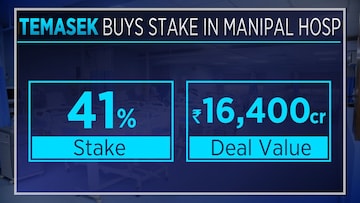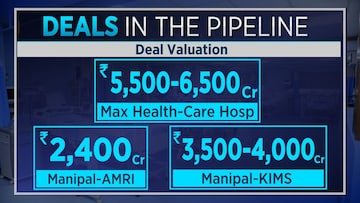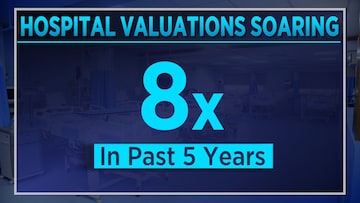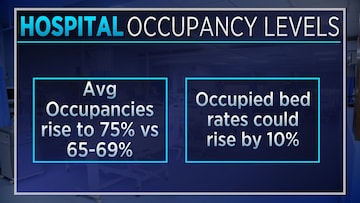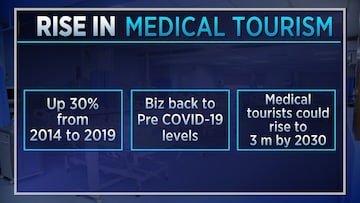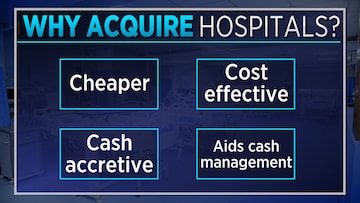"M&A seems to be the flavour of the season," H Sudarshan Ballal of Manipal Hospitals told CNBC-TV18. The hospital sector is abuzz with deals. From Singapore PE fund Temasek becoming majority stakeholder in Manipal Hospitals after buying an additional 41 percent stake for around Rs 16,400 crore to smaller deals such as Fortis picking up a 350-bed hospital near Delhi for Rs 225 crore.
Other deals in the offing could be Abhay Soi promoted Max Healthcare picking TPG run Care Hospitals. An Economic Times report is pegging valuations for the deal at Rs 5,500-6,500 crore. Others include Manipal buying the hospital chain of Emami Group AMRI for Rs 2,400 crore and picking up Kerala based private hospital chain KIMS for Rs 3,500-4,000 crore.
Acquisitions are done for various reasons. From increasing geographic presence to accessing pan India multi-speciality bed capacities quickly. For example Fortis with the acquisition of Medeor Hospitals will be propelled to become the second largest hospital with bed capacity in Gurugram. It will fulfill its strategic approach of expanding in the Delhi NCR geographic cluster.
On the other hand, Manipal could surpass Apollo Hospitals by increasing their bed capacity to over 10,000 beds in case the said acquisitions goes through, and Max which has over 3,400 bed capacity will access 2,400 beds from Care Hospitals helping it achieve targets of increasing its bed capacity by over 2x in the next 3-4 years.
Ballal too added that there were a lot of advantages of acquiring hospital chains rather than greenfield operations. "I think there's a lot of advantages of acquiring the chains of hospitals, rather than Greenfield projects, which take a very long time to start making money. So there is a significant advantage of acquiring large scale hospitals," he said, adding that Manipal Hospitals is also looking at a steady growth of 10 to 15 percent. "But certainly all of us are growing at a healthy level. And we do believe our occupancies will go from 60 to 65 percent, to about 70 to 75 percent in the future, and I think the acquiring hospitals is probably the better way of doing business. However, we are also looking at many Greenfield projects, mostly in the in the places that were already well established," he said.
The common thread among all the acquisitions is cashing in on the structural growth drivers. hence many are ready to pay top dollar for these acquisitions. Valuations for the hospital space have risen as much as 8x in the past five years with deals such as Manipal Temasek done at 10x MCAP to sales, a premium for 5 -6x versus peers.
These structural growth drivers include increased health awareness and insurance penetration post
COVID-19 and increased inflow from international patients as India positions itself as a medical tourism hub.
All this will help aid the operations of the hospitals. For example, average occupancies in the hospital space are expected to go from the current range of 65-69 percent to over 75 percent, average occupied bed rates could rise by around 10 percent.
On the other hand, Viren Shetty of Narayana Health said effective surgeries have bounced back, aiding occupancies. "It's always hard to project how things work out in the sector, the fact that there was a huge lag during the COVID time and people were not getting elective surgeries done, which has bounced back," he said.
And with the increase in general awareness about your healthcare, a lot of people have realised that they need to get checkups done, they need to start taking care of the health more and that ends up with them being active consumers of healthcare, but still, there is tremendous room to grow, he said.
"As a country and as a people, Indians are the least likely to seek medication, the least likely to access healthcare, have some of the worst health outcomes for people of the similar genetic disposition. And it just means that there is a large market for people who need to access health care that is there. So regardless of the international expansion and regardless of how you look at it, people do need more healthcare. And hospitals are here to provide that so that they can live, long, healthy and productive lives," he said.
Talking about valuations, Shetty said they are looking good, especially for the seller. "There are a lot more deals that will come about and as you said, the valuations are looking good for the seller. For the buyers, of course, these things tend to be quite expensive, but I guess, institutional KKR, Temasek, Carlyle have all done their homework, and they figured out that there's a lot of opportunity to make returns from how much they're investing in making these expensive acquisitions," he said.
As far as medical tourism goes, it has risen 30 percent from 2014 to 2019, with many of the large hospitals chains seeing business revert back to pre-COVID-19 levels currently. Estimates are that the number of medical tourists could rise to 3 million by 2030.
Lastly, why acquire? Today building a hospital requires a capex of Rs 1 to 1.2 crore per bed over and above land acquisition costs and other costs resulting in a timeframe of upto 3 to 4 years to come on stream.
Acquisitions are cheaper and more cost effective. Acquisitions, hospital owners and analysts say, is cash accretive from day one without capital to invest and build. Hence, all this is aiding cash management and possibly justifying valuations.
While talking about concerns, Ballal said the real problem is inequitable distribution of talent, whereas Shetty said affordable healthcare remains a concern. Shetty is also of the view that it does not make sense to spend huge amounts of money for M&A.
For more details, watch the accompanying video
(Edited by : Pradeep John)
First Published: Apr 21, 2023 9:49 PM IST


